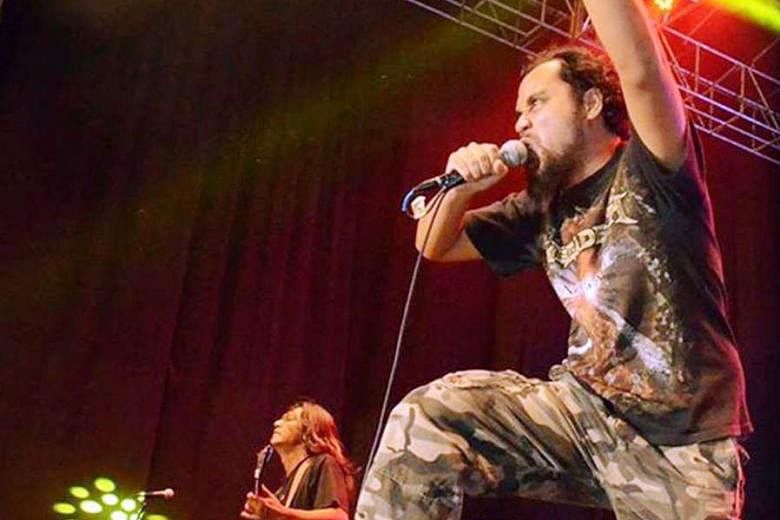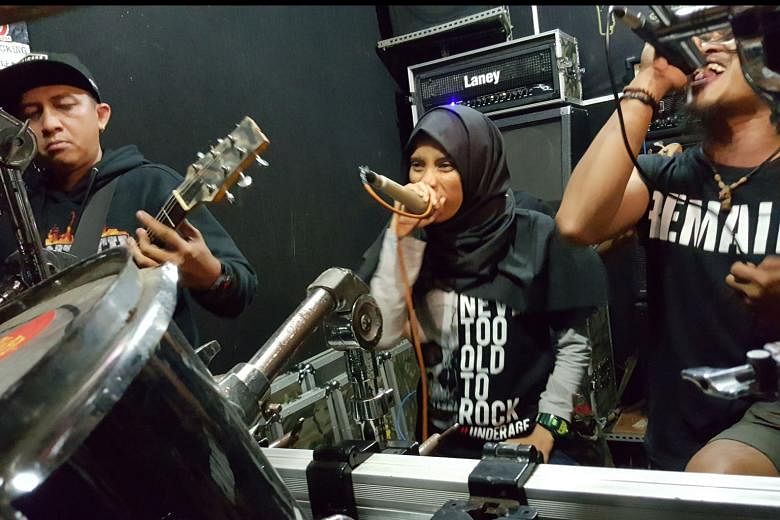BANDUNG • Wearing a black Muslim headscarf matched with a loose T-shirt that says " Never Too Old To Rock" and blue jeans, 34-year-old Asri Yuniar growls into the microphone.
"I burn with revenge and false hopes. In these falsehoods, I die in darkness. Darkness, darkness, darkness!" she screams, her eyes closed and her head swaying to the loud, rambunctious music reverberating through the tiny studio in Ujungberung, a town in Bandung, capital of West Java. Dubbed Kampung Metal, Ujungberung is the so-called birthplace of local metal music.
Unlike two decades ago, headscarf-wearing women like Ms Asri in metal bands are no longer frowned upon. Now, a number of female musicians donning the "symbol of Islam" are even rocking their electric guitars and drums on social media.
Metal music, with its dark lyrics and themes of death and doom, is very much alive - and thriving even - in Muslim-majority Indonesia. This is despite growing Islamic conservatism in the country, where rising intolerance has led to violence between mainstream Muslims and non-Muslims as well as religious minorities, including the Shi'ite and Ahmadiyah sects.
The music genre's growing acceptance in the community is largely attributed to musicians tweaking lyrics to suit local taste and decorum, a supportive metal community, as well as heightened awareness created by the Internet that allows bands to expand their fan base in the vast archipelagic nation.
Ms Asri, a mother of two who has a day job as a kindergarten teacher, is a vocalist with Gugat, or Threat in Indonesian, a hardcore metal band considered to be one of the country's pioneers in the genre.
"My parents protested at first and told me to quit. They said metal music is scary and so dark. But I only like the music. I don't smoke, drink alcohol or take drugs," she told The Straits Times.

"When I wore the headscarf two years after joining the band, fans told me, 'If you wish to pray, do it at home, not here'. But people are more accepting of us now."
Now hailed as the "new mainstream", metal music has captivated hundreds of thousands of fans, from the pluralistic city of Bandung, where metal is said to have taken root in the 1990s, to deeply religious Aceh province, where a concert last month saw teenage girls in headscarves head-banging along with boys.
Thousands of local bands hold concerts every year, drawing huge crowds of 1,000 to 45,000 each time. A concert by American band Metallica, held in Jakarta in 2013, attracted some 60,000 fans.
The genre's unlikely top supporter is none other than President Joko Widodo, who swears by seriously heavy Metallica, Napalm Death and Led Zeppelin "because rock is my passion", he had told the media.
The soft-spoken and mild-mannered man had thrilled metalheads around the world with photos of himself at metal concerts wearing his Lamb of God T-shirt and leather jacket and gamely flashing the sign of the horns, a hand gesture common within heavy metal culture featuring the index finger and the pinkie extended from the fist.
Music expert Bens Leo said metal music in Indonesia has evolved in the last decade, with more bands espousing nationalistic and non-destructive messages.
"The lyrics are not critical in a negative way. Nowadays, the musicians advocate the spirit of nationalism, and sing about how to protect women and the environment. Metal music reflects current social issues and serves to unite people," he said.
Beyond social issues, however, metal appears also to be entering the religious realm.
MUSLIM METAL?
"Ustad Metal", or the metal cleric, is what Mr Alfian Muhammad Tajul Arifin, 30, is known as.

In the day, he teaches the Quran at a Muslim boarding school known as a pesantren in the West Java city of Garut. On Friday nights, he literally lets his hair down, swinging the long strands around as he jams with not one but two death metal bands called Jiwa, which means Soul in Indonesian, and Tormentor.
"I don't see anything wrong. Conflicts stem from the lack of understanding. It's like saying those people in pesantren must be fanatics and those in metal bands must be baddies. I live in both worlds and I can say it's all untrue," he said.
However, he draws the line at preaching Islam through his music.
"It's inappropriate. Metal music has negative connotations, so why use it to spread Islam? And why preach by shouting? What if your messages are wrong? Well, let's leave the religious teachings to the clerics," he added.
His view, however, is not shared by an underground "Metal Satu Jari" or "one-fingered metal" movement, which burst onto the scene six years ago. With a single raised index finger to symbolise One God, these Muslim bands spread religious teachings through their music.
During concerts, some shout verses from the Quran, while others abruptly stop to perform mass prayers with their fans when the azan, or call for prayer, rings out. A few post provocative music videos online showing them with firearms.
Mr Mohamed Rohman, 38, vocalist with the band Jasad, or Corpse, said he was criticised by a Muslim band for burning incense, a traditional Indonesian ritual.
"It's to give a nice aroma. But instead they asked me 'Why are you feeding the Satan?'" he said.
Indeed, Indonesia has not been spared as rising religious fundamentalism sweeps across Asian nations. Some local governments have begun to impose religious directives on dress codes and behaviour.
Hardliners have also labelled underground music as a form of devil worship and believe it to be haram, or forbidden in Islam, a charge metal bands have swiftly struck down.
"My voice is not used for phone porn sex so, why haram?" Ms Asri retorted. "Metal sounds rough, but it is tolerant and celebrates diversity and creativity. It is not deviant."
Purgatory, a Jakarta-based Muslim metal band, said it takes care not to go overboard and shove religion down people's throats.
Band drummer Aminuddin Muqoddas, 36, said the band only encourages a clean, moral lifestyle "free of sins". Walking the talk, the band shuns events sponsored by beer and cigarette companies.
"Allah's laws must not be violated, like getting drunk and womanising. We don't want to send wrong messages, so we always check our lyrics against religious scripts," he said.
Band members perform with their faces painted like zombies, not because they want to court controversy, he said. "We are entertainers after all. Looking scary is just for fun," Mr Aminuddin said.
Metal musicians, however, have noted greater openness to metal culture in Islamic boarding schools and conservative provinces such as Aceh, where partial syariah law is practised.
Popular home-grown metal band Burgerkill, which has been on gigs in Europe, Asia and Australia, said it had performed to only a thousand fans in Aceh in 2012, but "multiples of thousands" last month.
"Never mind that the crowd had to be separated, girls in front and boys at the back," guitarist Ariestanto, 40, told The Straits Times.
"We were just shocked to see so many and thought, 'Man, this is big'. It was crazy, and so cool. It's Aceh, where the first thing you hear when you land at the airport is people reciting prayers," he said, laughing.
He attributed the rising popularity of metal music to the Internet, where bands have begun to upload their latest songs and even professionally created music videos put on YouTube.
He might have added also the musicians' own innovations, either through borrowing from the country's musical past or their inventiveness.
METAL NEVER DIES
Half a dozen teenagers sit in a circle in an old library in Soreang, a town on the outskirts of Bandung, with what looked like ice-cream sticks pressed between their lips.
A series of breathing and tapping movements produce a symphony of mellow sounds and vibrations.
"And that's how you play the karinding," said Mr Muchammad Dzulkarnain, 34, from metal band Karinding Attack, which revived the long-forgotten traditional Sundanese bamboo instrument in 2009. The band also uses the traditional flute and harp, as well as a newfangled contraption made of squeaky kids' shoes stuffed in a section of bamboo. "Squeak, squeak, squeak, irritating, isn't it? But it makes the music memorable," he said.
"We also add a metal element using a more upbeat tempo, and our country-bumpkin karinding is cool again."
As a "positive contribution" to the music world, the band writes books on karinding, sources local artisans to make it for sale, and even teaches students to play it, he said.
Innovation by bands like Karinding Attack helps to keep metal music fresh. A supportive community which shares knowledge and actively promotes new bands also ensures the genre's survival.
In Bandung, officials said work is in progress to turn it into a creative city with a vibrant music scene.
"Bandung is a music warehouse. There are a lot of new creations and out-of-the-box innovations which mix old and modern music, not just metal. We plan to have a music festival," Ms Kenny Dewi Kaniasari, an official at the city's culture and tourism ministry, told The Straits Times. " We are also a melting pot of various faiths, ethnicities and cultures. We respect our differences," she added.



